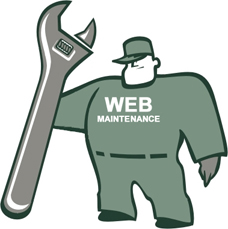Why do I need a CMS?
There are dozens of reasons your website needs to be in a content management system (CMS), but here are 10 that I came up with off the top of my head. If you need help putting your site into a CMS or need website maintenance, please contact Bravo Web today.
1. Caching and Performance Optimization
When your website uses a modern cms you can install optimization modules that make your pages cache on visitor computers and this makes them load lightening fast on succeeding visits. This is also an SEO measure that will improve your SE position as since Google favors websites that load fast.
2. Guest Blogger
When your website is in a cms you can allow access to only certain parts of it to other people by simply going through a checkbox list of permissions. For example, lets say you want to hire a guest blogger to contribute articles on your website. You can effortlessly configure your website to allow access to add articles (or only create revisions to articles), publish articles with your approval, publish automatically at a specified date, restrict deleting to only specific items, as well as restrict or grant access to just about any of your website back-end features. When it's time to scale up your web content and add authors, with a cms you're set.
3. Open Source
The most widely used cms out there are open source, which means they are freely available for you to download and configure for your purposes; all for free. This isn't the best reason however, the real advantage of an open source system is the community contributions. These are the continual improvements made to the cms and its contributed modules by the open source community. That's right, you get the codebase free, and you get the ongoing improvements free. This is an important aspect to understand, because many times the improvements are security enhancements to protect your site from malicious software attacks or other vulnerabilities.
4. Ease of Management
Back in the day, if your website had 24 "pages", then if you added a new one, you'd have to edit the 24 other pages to include a link on them to point to your 25th page - very cumbersome. People became good at opening up multiple files and performing find and replace functions in order to update navigation across multiple pages. With a cms you're able to effortlessly add or edit any navigation links by going to an easy list of all your site links, make an edit, then the changes take place across all pages.
5. Adding Content
When you have a cms installed on your website you can easily add pages. In fact, you can add an unlimited number of pages, articles, posts, images. In case you didn't know, content is the name of the game these days, but it's got to be good content.
6. Redirects
It's important to add an appropriate redirect to your internal website files when pages are deleted. In order to retain rank a 301 Redirect is the specific redirect you need to put in place, and even more so if there are other sites pointing to the deleted page. Even though you may believe no other site is linked to it, it's better to put a 301 Redirect in place anyhow in order to be sure.
7. Archive
Never delete - archive. Unless it's spam or robot porn or a mistake. With a modern cms system you can easily archive any page, image or other content on your website at the click of a button.
8. Plug-ins and Modules
Do you need a newsletter, a forum, a commenting system, a captcha, a mobile theme, chat system, an advertisements system - just about anything you can think of; if you've seen it on a website yourself then it's more than likely that there's a module or plugin you can download for FREE. Then it's just a matter of install on your site and configure for your purposes. The upside - free, abundant, quick to try out. The downside - sometimes they require complicated setups and sometime they just don't work. Nonetheless, gone are the days of custom programming those standard features; just download the plugin!
9. Layer Separation
When you have a cms your site is layered - there's the logic/data layer, and there's the design/presentation layer. Great, so what does this mean and why is it important? This means when it's time to update the look and feel of your entire website you can simply install a new theme; all of the nuts and bolts underneath keep working like before becuse of layer separation. You don't have to start all over on your website in this way when it's time for a revamp. This makes sense and it's a good thing, as since a major goal for your site should be to be continually adding content (pages/articles/images, etc.).
10. Support
Using a well known cms like Wordpress or Drupal will set your business website with the software support that it needs in order to sustain.


